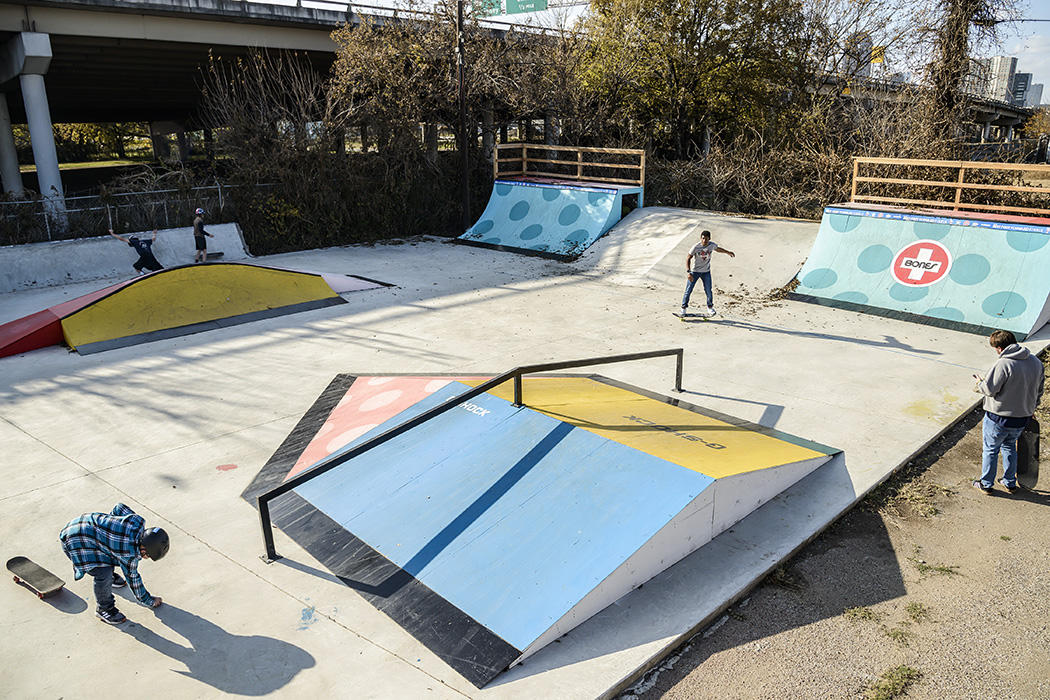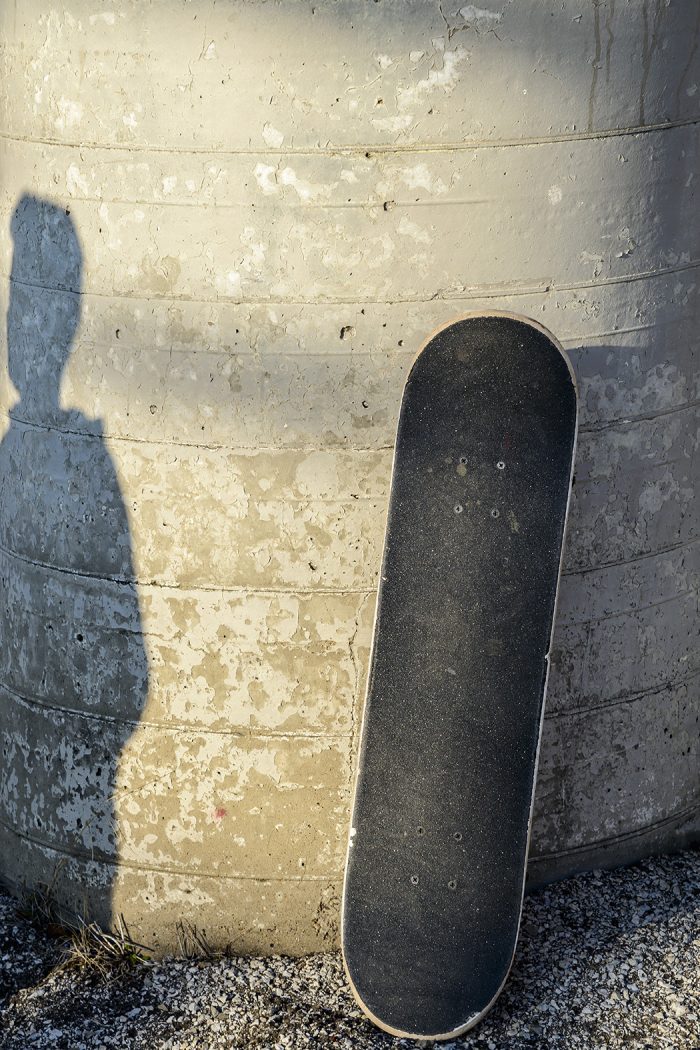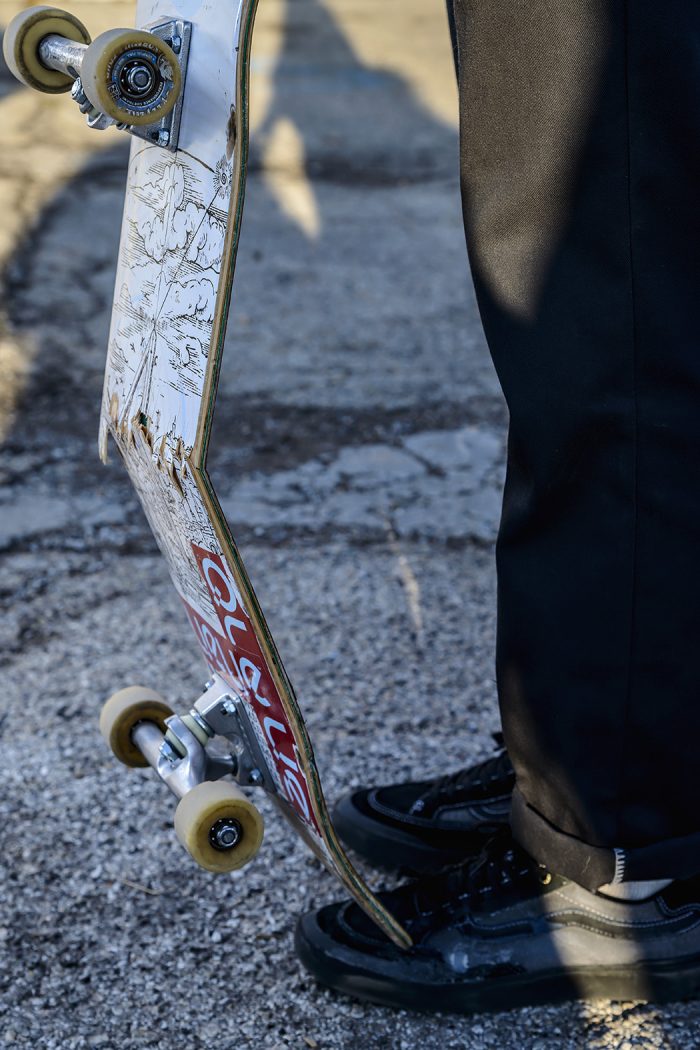
Photo by Danny Fulgencio.
Mike Crum has been skateboarding ever since he saw Marty McFly kick up his board after hanging on to the back of a moving vehicle in “Back to the Future.”
The scene, choreographed by a young Tony Hawk, inspired a generation of skateboarders like Crum who have gone on to promote the sport and support young skaters.
Crum turned pro at 16 and competed professionally as a vert skater on half-pipe ramps used in competitions like the X Games. From the ramp’s vertical walls, skaters can perform some of the most progressive aerial tricks.
During his career, Crum was ranked one of the top 10 vert skaters in the world and won four vert doubles medals at the X Games. He skated for brands like Hurley and Oakley before retiring in 2007.
“I definitely could make a living off it, but to do that, you have to do it daily and not worry about anything else,” Crum says.
Skateboarding may be a young man’s sport, but Crum still rides at his nonprofit skate park, 4DWN. The donation-based park provides a variety of after-school activities and mentorship programs for at-risk youth.
4DWN also partners with outside organizations for events, such as the DGK Saved by Skateboarding clinic. At the event, pro skaters Boo Johnson and Don Cooley gave 15 skateboards and other goodies to South Dallas youth.
“Skateboarding knows no boundaries,” Crum says. “It knows all walks of life.”
The idea for the skate park arose from the early years of Dallas skateboarding, when legends like Craig Johnson and Jeff Phillips inspired the city’s youth. Crum grew up skating at the Jeff Phillips Skate Park, but when he retired and moved back to Dallas from California, the city no longer had a public skate park.
In 2011, Crum and his partner Rob Cahill started their own private skate park in the Cedars. Called the Underground, it became the first version of 4DWN. In 2016, they moved to the current space at 2633 Ferris St. after becoming a nonprofit.
Crum tried to transfer the old course into the new space, but he says it wasn’t the right fit. With community contributions and donated materials, he and his friends built the new park from scratch.
“I had to fight for it,” Crum says. “I had to really want it and keep it going. I pushed for it to happen.”
Today, the park includes an indoor street course, an outdoor course, a bowl and a mini ramp. Yet 4DWN is more than just a skate park, Crum says. With a boutique shop, community garden, art gallery and outdoor concert stage, the former pro sees the space as a community center where artists, athletes and neighbors can connect.
Crum’s vision culminated in September when 4DWN hosted the Zumiez Best Foot Forward finals. The competition was designed to support skateboarding at a local and global level by organizing more than 40 regional competitions around the world. The winners then converged on Dallas to compete in front of 1,200 fans and industry sponsors.
4DWN temporarily closed for six months to build the Zumiez course, which featured art from Dallas muralist and skateboarder, Drigo. Known for his work at the Sweet Tooth Hotel, Drigo used bright colors, gradients, polka dots and the image of an eye to bring the course to life.
Since reopening, people of all ages can be found shredding the colorful ramps or learning the sport from a team of hands-on instructors. At an event in November, skaters from Dallas, Fort Worth and the suburbs met at the park for companionship and competition.
One attendee was 12-year-old Luke Sircely. The Frisco native started skating four years ago after getting a skateboard for Christmas. He’s gone on to win competitions across the United States and earn sponsorships from Super 8 Skateboards and Grom USA. He hopes to become a professional and skate in the Olympics.
“I like the vibe around here, and the ramps are really impressive,” Sircely says. “I like going fast and flying through the air.”
During a mini ramp contest, Sircely didn’t hesitate going head to head against dozens of skaters more than twice his age. As the sun set, skaters could be seen flying through the air, performing tricks that the announcer described as the “backside disaster” or the “Miller flip.” Spectators couldn’t contain their gasps when skaters landed a difficult trick or tumbled to the ground.
The evening of art, music, food and skate contests was exactly what Crum envisioned when he opened 4DWN.
“It’s a way of giving back,” Crum says. “I got a lot out of skateboarding and what it did for me. It’s a unique community.”







